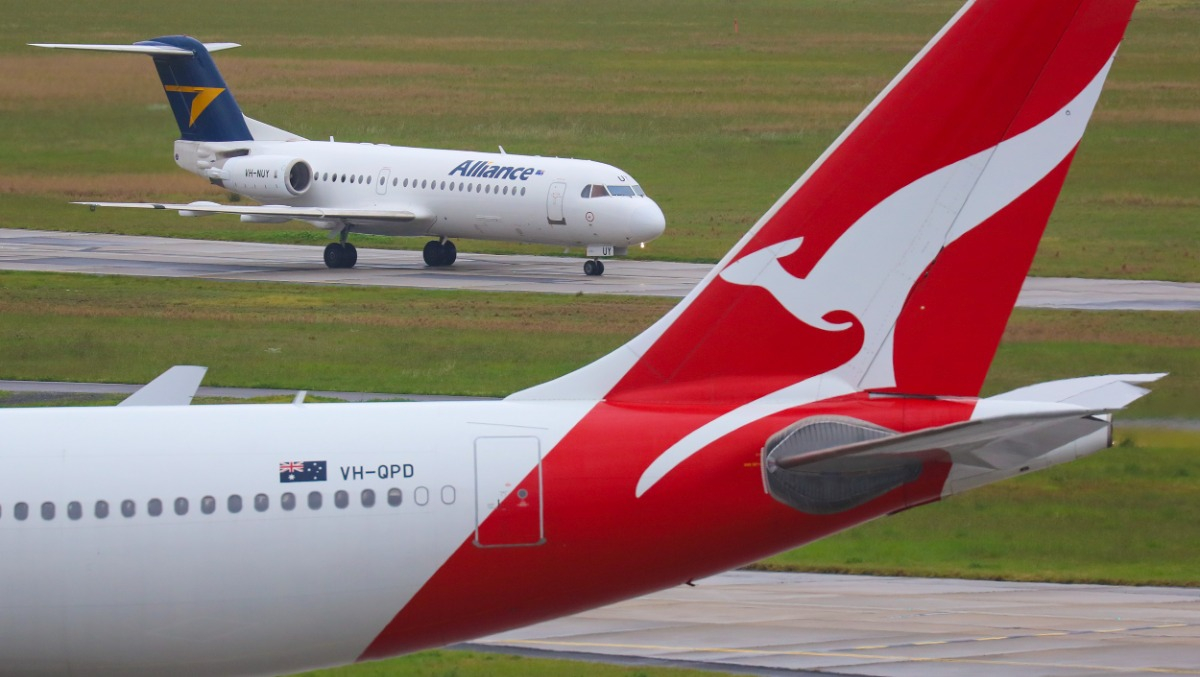
The TWU has hinted it will use new multi-employer bargaining laws to benefit now-outsourced workers who provide services to Qantas.
The law is expected to pass through parliament this week and allows “reasonably comparable” businesses to join together for a single agreement.
It follows the Federal Court ruling last year that Qantas was wrong to outsource 1,600 ground-handling roles. The union argued it meant employees were worse off because they were without the long-time enterprise agreements negotiated with Qantas.
In new comments to The Australian Financial Review on Wednesday, the TWU’s national secretary Michael Kaine said the new laws were a “lifeline for aviation workers” and the “multiple aviation companies” that engage them.
“When laws are in place, we intend to use them responsibly to get wages moving, working with aviation companies to pursue a more level playing field, enhancing job security, and stemming the splintering of work across our airports.”
Kaine argued Qantas had “gamed” the current system to fragment the workforce. Qantas has consistently denied this claim and argues it’s the highest-paying airline in the country.
Earlier this month, the Flying Kangaroo’s chairman, Richard Goyder, said the proposed reintroduction of multi-employer bargaining wouldn’t work because it ignores how different companies in an industry have different needs.
Speaking at the airline’s AGM, Goyder argued it would have a “massive” impact on productivity, growth and the ability to pay staff more.
“We’re concerned that lowering the bar for compulsory arbitration and enforcing multi-employer bargaining would effectively lead to centralised wage setting,” he said.
It came after chief executive Alan Joyce said multi-employer bargaining would have made it impossible for a business such as Jetstar to launch, adding new rules could “take us back to the 80s”.
Joyce said Jetstar “changed the aviation market” by introducing efficiencies that allowed for prices as low as $35.
“We did set up Jetstar with the aim of democratising air travel and allowing millions of people to travel for the first time,” he said.
“If there was multi-employer bargaining at the time, I’m not sure that would have happened, and a lot of other things wouldn’t have happened.”
Qantas also this month won the right to a final appeal against the Federal Court’s ruling that it was wrong to outsource 1,600 ground handlers.
In early 2021, the Flying Kangaroo moved to outsource ground handling operations at the 10 Australian airports where it was still running them in-house, including Adelaide, Brisbane, and Melbourne. This decision resulted in nearly 2,000 roles overall being made redundant.
The TWU brought the airline to court over the decision, and in August 2021, the Federal Court ruled that Qantas had violated parts of the Fair Work Act, and then rejected an initial appeal.
Qantas has consistently denied it did anything unlawful, and will now be able to make its case at the High Court next year.
















Paul
says:The TWU current leadership seems determined to damage the aviation industry in Australia. The industry is small enough as it is yet these militant unions will hurt the industry. What they do not realise is the actions they are proposing, if successful, will only lead to increased fares, more inflation and ultimately increased interest rates.
Bob
says:Qantas will be trying very hard to automate baggage handling now if they werent already.
We want more pay with lower productivity(The Australian Way)
john bradshaw
says:This new power bargaining allowing others into same style deals, is all well and good.
But there better be a balance or it may see “company verses compan” and that may be worse than “company deals with Union”?????
Losers may fall or leave, and with costs going insanely high, because of the climate warming policies of Albanese !
( in my opinion climate fear is a fraud and false)
The price of massive demands may ruin a smaller company which has to take on not just the union in his/her establishment. But the large union that hammers the big boys and find smaller ones badly hurt after being dragged in.
Whether this is far fetched or unlikely , we don’t really know.
But policies without balance can create disaster, even if a union gets exactly what it wants, in these certain cases
some smaller companies that can’t do it, will fold. Its happened before.
That of course sees the jobs go without the company being in existence. Everyone loses.
It also brings up the fact that out of our non caring larger business giants some will just
close down. Out of spite or just not be bothered.
And Australia is a green government run place! With barely any effect on emissions, even if
we stopped coal and gas yesterday, we make no difference.
But here we get this conjoining of companies being affected by some (not all) but some militant wealthy unions, who rarely fight for the rank and file but gain wealth from some super funds and other activities , don’t ask I don’t know but some of these unions do not need rank and file anymore. So what are they.
I am unsure of how connecting companies with like problems and the unions because of it have a win, then eventually you kill the goose and no golden egg arrives!